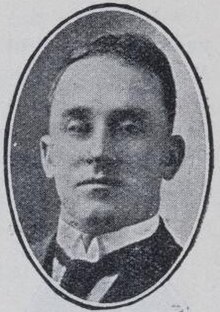
Thomas Patrick Howard (13 March 1880 – 9 July 1949) was an Australian trade unionist and politician. [1] He was a member of the South Australian House of Assembly from 1933 to 1938, representing the Lang Labor Party (1933), South Australian Lang Labor Party (1933–1934) and Labor Party (1934–1938).
Howard was born in Gilbert Street, Adelaide, and educated at Christian Brothers College. He worked as a shop assistant in a warehouse before apprenticing as a painter and decorator in 1894, later working as a house painter. [2] He became a delegate for the Labor Party in 1908, and was elected president of the Painters' Union in 1909. He became the union's assistant state secretary in 1913, and succeeded T. B. Merry as state secretary that December. [3] [4] He served as state secretary of the Painters and Decorators Union until 1934. [2]
He was the secretary of the Anti-Conscription Campaign in 1916, represented his union on both the United Trades and Labour Council of South Australia and the United Labor Party, served on the union's federal council and was a member of the Painters and Decorators' Wages Board. [2] [5] In 1918, he was elected president of the Trades and Labor Council, and in 1920 shifted to the role of its secretary, which he would hold until 1932. [6] [7] [2] He was an unsuccessful Labor candidate for the House of Assembly at the 1918 election, 1921 election and 1924 election, in the Liberal-leaning seats of Sturt and Barossa. [8] [9] [10]
In 1933, in the wake of the Great Depression and the 1931 Labor split, Howard was elected to the South Australian House of Assembly for Adelaide, representing the Lang Labor Party, a faction of the Labor Party supporting the ideas of Jack Lang, the Premier of New South Wales. In April, however, he and fellow Lang Labor MP Bob Dale left the party after disputes with leader Doug Bardolph, forming their own breakaway group, the South Australian Lang Labor Party. In June 1934 the various Labor factions were reunited. Howard was defeated at the next election in 1938. [11]
In 1945, he retired from the union movement and his then role as state secretary of the Shop Employees and Warehouse Employees' Union, citing failing hearing. [12] He died at his home in Sturt Street, Adelaide in 1949, aged 69, and was buried in the Catholic Cemetery at West Terrace. [13] [14]
References
- ^ "Well-known Labor man dies". The News. 11 July 1949. p. 3. Retrieved 19 January 2016 – via Trove.
- ^ a b c d Coxon, Howard F.; Playford, John & Reid, Robert (1985). Biographical Register of the South Australian Parliament, 1857-1957. Wakefield Press. p. 113. ISBN 9780949268242. Retrieved 25 December 2018.
- ^ "Federated House and Ship Painters Employees' Association". Daily Herald. 7 January 1913. p. 2. Retrieved 19 January 2016 – via Trove.
- ^ "Federated Painters". Daily Herald. 10 December 1913. p. 2. Retrieved 19 January 2016 – via Trove.
- ^ "MR. T. P. HOWARD". Daily Herald. 15 January 1917. p. 6. Retrieved 19 January 2016 – via Trove.
- ^ "Echo of recruiting conference". Daily Standard (Brisbane, Qld. : 1912 – 1936). 7 June 1918. p. 3. Retrieved 19 January 2016 – via Trove.
- ^ Labor's thirty years' record in South Australia : a short history of the Labor movement in South Australia, including biographical sketches of leading members, 1893–1923. Daily Herald. 1923. p. 84.
- ^ "Central district No. 2 and Sturt". The Register. 11 April 1918. p. 7. Retrieved 19 January 2016 – via Trove.
- ^ "Union Jack, red flag, and green flag". The Register. 14 April 1921. p. 8. Retrieved 19 January 2016 – via Trove.
- ^ "South Australia". The Sydney Morning Herald. 9 April 1924. p. 12. Retrieved 19 January 2016 – via Trove.
- ^ "Mr Thomas Howard". Former members of the Parliament of South Australia. Retrieved 23 August 2022.
- ^ "Mr T. P. Howard retires". The Advertiser. 21 March 1945. p. 7. Retrieved 19 January 2016 – via Trove.
- ^ "Death of Mr T.P. Howard". The Advertiser. 12 July 1949. p. 3. Retrieved 19 January 2016 – via Trove.
- ^ "Advertising". The Advertiser. 12 July 1949. p. 12. Retrieved 19 January 2016 – via Trove.